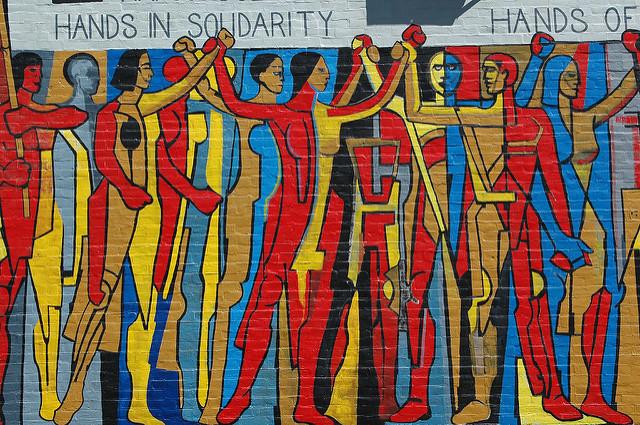socialsolidarityeconomyispossible - restart.utopia.sk
Social solidarity economy - a more equitable economy and society is possible
Karolína SilnáThe article briefly introduces the concept of social solidarity economy (SSE). In addition to the general characteristics, it also mentions Czech traditions and the context of the SSE. According to the author, it offers one of the answers to the challenges and crises of today's globalized world, including the current coronavirus crisis. As an advantage of the social solidarity economy, the paper highlights the satisfaction of the wider needs of individuals and local communities and greater respect for the environment.
Financialization, or the uncontrolled expansion of the financial sector into other sectors of the economy, is growing and market liberalization continues (despite some trends, particularly those connected with the policies of current US President Donald Trump). Precarisation of labor, poverty and poor living conditions, climate change problems, environmental pollution, species extinction, depletion of natural resources and war are sad realities. The current dominant economic system is striving for endless growth, and most policies and strategies are set accordingly. The economic, social and environmental crises are interconnected - the current COVID-19 pandemic and the problems it is pointing out and deepening only confirm this. However, as a result of these crises, there is also a resurgence of interest in alternative production, distribution and consumption patterns, which can be crucial in the transition to a more cohesive and greener approach.
Financialization, or the uncontrolled expansion of the financial sector into other sectors of the economy, is growing and market liberalization continues (despite some trends, particularly those connected with the policies of current US President Donald Trump). Precarisation of labor, poverty and poor living conditions, climate change problems, environmental pollution, species extinction, depletion of natural resources and war are sad realities. The current dominant economic system is striving for endless growth, and most policies and strategies are set accordingly. The economic, social and environmental crises are interconnected - the current COVID-19 pandemic and the problems it is pointing out and deepening only confirm this. However, as a result of these crises, there is also a resurgence of interest in alternative production, distribution and consumption patterns, which can be crucial in the transition to a more cohesive and greener approach.
Triple benefit
The social solidarity economy (SSE) is based on the principle of threefold benefits: economic, social and environmental. These activities are not only focused on generating profit, and therefore create many more positive externalities – both for people and for the environment.
There are many definitions of social solidarity economy - it has deep roots in various visions and historical forms of mutual assistance and co-operation around the world. These different ideas can be linked by the values and principles on which the social solidarity economy is based: mutual assistance and co-operation, emphasis on non-economic needs, a deeper understanding of prosperity, democracy, belonging, striving for community development and respect for the environment.
There is a number of SSE-based organizations such as co-operatives, non-profit organizations, associations, foundations and social enterprises, which are embedded in communities and focus on consolidating social capital at the local level or promoting social innovation. These include a variety of projects and initiatives, such as community supported agriculture (CSA), shared housing, local exchange trading systems (LETS) and other ways of exchanging products and services at the community level, charities, community repair shops, recycling and creative workshops, various restaurants, cafes, bistros and patisseries employing the disadvantaged, co-operative newspapers and publishing houses and much more. In Europe, we find around 2 million social solidarity economy organizations, which employ over 11 million people (around 6 % of the working population of the European Union).
There are many definitions of social solidarity economy - it has deep roots in various visions and historical forms of mutual assistance and co-operation around the world. These different ideas can be linked by the values and principles on which the social solidarity economy is based: mutual assistance and co-operation, emphasis on non-economic needs, a deeper understanding of prosperity, democracy, belonging, striving for community development and respect for the environment.
There is a number of SSE-based organizations such as co-operatives, non-profit organizations, associations, foundations and social enterprises, which are embedded in communities and focus on consolidating social capital at the local level or promoting social innovation. These include a variety of projects and initiatives, such as community supported agriculture (CSA), shared housing, local exchange trading systems (LETS) and other ways of exchanging products and services at the community level, charities, community repair shops, recycling and creative workshops, various restaurants, cafes, bistros and patisseries employing the disadvantaged, co-operative newspapers and publishing houses and much more. In Europe, we find around 2 million social solidarity economy organizations, which employ over 11 million people (around 6 % of the working population of the European Union).
Czech roots and the present SSE
However, SSE also has deep roots in our country, for example in the more than 170-year long history of activities of various associations and self-help initiatives, which we can build on. While social entrepreneurship has long been perceived in the Czech Republic primarily as the employment of the disadvantaged, in recent years this view has changed and shifted towards a social solidarity economy. It is mainly thanks to start-ups and initiatives that motivate and show that it is possible, but also thanks to campaigns and awareness-raising projects and programs. In the current environment, it is important to support the development of the social solidarity economy with public policies. For example, France has passed a law on social solidarity economy as early as in 2014 – there are many examples and sources of inspiration, but the Czech Republic still does not have a law on social entrepreneurship.
The people and initiatives around us are proving that there are indeed alternatives that allow for a sustainable life based on mutual help and solidarity with people and the environment. This is the right common way to overcome these crises.
The people and initiatives around us are proving that there are indeed alternatives that allow for a sustainable life based on mutual help and solidarity with people and the environment. This is the right common way to overcome these crises.
Selected sources of information on social solidarity economy:
Czech social entrepreneurship - MLSA project to support social entrepreneurship: https://ceske-socialni-podnikani.cz
RIPESS Europe - European Network for Social Solidarity Economy: https://www.ripess.eu/
socioeco.org - website with information and resources on SSE: http://www.socioeco.org/index_en.html
TESSEA, z. s. - thematic network for social economy in the Czech Republic: http://www.tessea.cz
Czech version of this article was published in expert, reviewed journal Social Policy Forum 2/2020, April 2020, printed (page 30) and online version: https://www.vupsv.cz/2020/04/15/forum-socialni-politiky-2-2020/
RIPESS Europe - European Network for Social Solidarity Economy: https://www.ripess.eu/
socioeco.org - website with information and resources on SSE: http://www.socioeco.org/index_en.html
TESSEA, z. s. - thematic network for social economy in the Czech Republic: http://www.tessea.cz
Czech version of this article was published in expert, reviewed journal Social Policy Forum 2/2020, April 2020, printed (page 30) and online version: https://www.vupsv.cz/2020/04/15/forum-socialni-politiky-2-2020/

Photo by Terence Faircloth, CC BY-SA 4.0, via Wikimedia Commons
